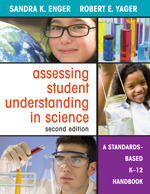Assessing Student Understanding in Science
A Standards-Based K-12 Handbook
- Sandra K. Enger - University of Alabama at Huntsville
- Robert E. Yager - University of Iowa, Iowa City, USA
"In this second edition, Enger and Yager expand their previous work by suggesting new assessments and more clearly connecting their assessments with the National Science Education Standards. For classroom teachers, this book offers a range of suggestions that can enhance instruction. For science teacher educators, this book is an invaluable and handy resource in working with beginning, new, or experienced science teachers."
—Julie A. Luft, Professor of Science Education
Arizona State University
Create and customize assessments to determine student understanding in six domains of science!
Carefully designed assessments can give teachers the information they need to improve instruction and help students meet educational goals and objectives. This updated resource offers a multifaceted approach to measure what students know and can do as a result of their learning experiences.
Assessing Student Understanding in Science provides educators with essential methods to best assess student proficiency and performance in science. The authors provide an extensive collection of strategies and examples for elementary, middle, and high school classrooms. Aligned with national science standards, the book includes:
- Criteria to measure student progress in six critical domains of science—concepts, processes, applications, attitude, creativity, and the nature of science
- Strategies to evaluate your teaching practice, such as action research, video recordings, and journaling
- Information about using formative assessments to inform teaching
- Methods for assessing student work using portfolios, self-evaluations, and rubrics
- An introduction to using science notebooks as assessment tools
With the proven frameworks in this book, teachers can build customized assessments to meet instructional needs and prepare students to succeed in science.
“In this second edition, Enger and Yager expand their previous work by suggesting new assessments and more clearly connecting their assessments with the National Science Education Standards. For classroom teachers, this book offers a range of suggestions that can enhance classroom instruction. For science teacher educators, this book is an invaluable and handy resource in working with beginning, new, or experienced science teachers.”
"This valuable contribution to the field offers clear explanations and examples of different types of assessments and suggests very practical applications for teachers of all levels. The authors present some wonderfully creative approaches to assessment, going beyond the usual methods."
"The material enables readers to self-assess on many levels: their own understanding of assessment in general, how assessment looks within the science content, and the many different applications. The coverage appeals to science teachers at all levels and all disciplines."
"Does an exceptional job of addressing the most controversial and misunderstood aspect of delivering quality science instruction. The six domains of quality science teaching are addressed with examples of what is included in each. The book clearly describes various types of assessments, with the advantages and disadvantages of each. It also provides numerous references on asessing students in science."
“Drawing on the latest research, best practices, and the wisdom of practitioners from all levels of the education spectrum, this powerful, comprehensive document pinpoints and prioritizes our work to ensure a foundation for all classroom applications of assessments. This is an invaluable resource for educators, K-12."
"This text offers information regarding the theory and real-world applications of a variety of assessments that can be used to address the unique standards of science education. The text addresses the need to assess all six domains of science literacy and offers tried-and-true methods and instruments that can be used to assess each domain. It does so by providing definitions of each domain and offering specific suggestions as to how the results can be used across the range of levels in our schools. The text is a wonderful collection of science-specific assessment information that can be used by those of us interested in assessing students and conducting research in K-12 science education."



